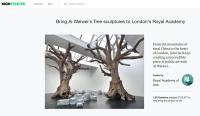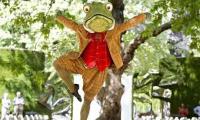The White Review, BOMB and Guernica are just some of the magazines turning to the wisdom of the crowd to publish quality literature. Read more about why this is the case on the Guardian below.
News and events
As crowdfunding is increasingly adopted by large arts organisations as a fast-track alternative to dwindling public funding, Henrietta Norton – co-founder of the early crowdfunding site WeDidThis – argues that the spirit of risk taking and innovation that inspired early adopters needs to be embraced by these high-profile newcomers.
More than simply an innovative approach to income generation, crowdfunding provides arts organisations with opportunities to develop new audiences, test new ways of working and generate advocacy and PR opportunities. Read more on the Guardian below.
Here is an overview of participatory financing (aka crowdfunding) in France and its main players. Read more ad Journal Du Net below.
Check out these tips and tricks shared by creatives with the Guardian.
The phenomenon of crowdfunding is booming. You can stake from just £10 to emulate the likes of Duncan Bannatyne by becoming a "mini-dragon", backing an ever-expanding range of ventures from theatre productions to electronic gizmos.
Crowdfunding has developed from a digital quirk to a powerful tool – this much we've talked about. But there is something even deeper going on with this new model, one that's less predictable than civic participation and far more disruptive.
This paper by Sara Bannerman examines crowdfunding as a potential tool for cultural funding. After an introduction to crowdfunding, its rise and its use in various contexts, the paper discusses crowdfunding’s potential as a tool for funding cultural production. Crowdfunding is associated with a range of hopes and ideals, but problems with crowdfunding, as with crowdsourcing, can also be identified.
Crowdfund UK has teamed up with Nesta, Heritage Lottery Fund and Arts Council England to distribute 250,000 towards arts and heritage campaigns in the UK as part of a new crowdfunding program.
The pilot will provide two streams of £125,000 in matchfunding to arts and heritage projects that have received backing from the crowd.
The Best Practice is a market-driven instrument, which was developed at the initiative of the crowdfunding platforms and seeks to create a self-regulatory environment flexible enough to take into account all types of crowdfunding business models. It provides guidance to the platforms on how to increase the transparency and clarity level of their activities.












